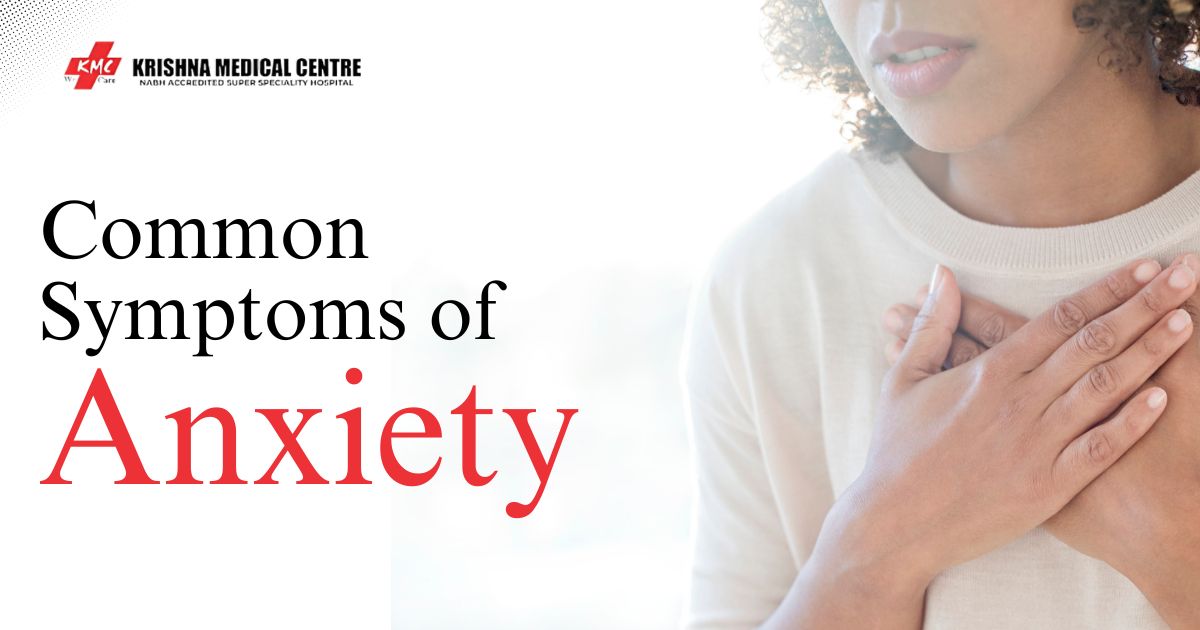Human life consists of emotions, and anxiety functions as a persistent element that affects almost everyone during their lifetime. The basic manifestation of anxiety can function as a beneficial partner by helping us concentrate, driving us to prepare, and making us aware of risks. Permanent dominant anxiety causes an emotion that initially helps people to evolve into a disabling medical condition.
These anxiety symptoms should be expected in normal human behavior, even though they only appear occasionally. You can distinguish normal anxiety from an anxiety disorder through how often the symptoms appear and how intense they become along with their continuous existence in your life, which reduces your capability to perform effectively. The presence of persistent anxiety disabilities in your daily existence indicates the need to evaluate potential anxiety disorder diagnosis possibilities.
This complete educational article explores the typical anxiety signs which appear in three main areas including emotions and physical attributes plus behavioral expressions.
What is Anxiety?
Human nature produces anxiety through feelings of worry along with nervousness or unease when someone faces uncertain situations. People naturally experience this emotional state because it detects potential threats to help them get ready for upcoming challenges.
The extreme and ongoing nature of unmanageable anxiety describes what doctors call an anxiety disorder. Anxiety disorders bring up constant and prolonged worries, which create severe impacts on your everyday experiences and steer you away from focusing and sleeping as well as interacting with others.
Common Symptoms of Anxiety
Emotional Symptoms
- Excessive Worry: People with anxiety experience continuous and unrealistic concerns about minor issues that constitute their primary manifestation. The worry becomes out of proportion to real dangers but maintains strong control over a person’s ability to manage it simultaneously while feeling overwhelmingly present. Throughout the day, people replay mental images of frightening events continually while worrying about future negative outcomes.
- Feeling Agitated or Restless: People experiencing anxiety usually become restless and agitated because nervousness interferes with their ability to feel calm and maintain physical stillness. Your body remains in a state of tension because you experience continuous arousal together with a need to take action. The sense of restlessness shows through body movements, such as concentration difficulties.
- Irritability: High anxiety levels decrease your tolerance for frustration, so minor annoyances cause quick temper reactions. Irritability affects relationships negatively and impedes our ability to think reasonably.
- Difficulty Concentrating: Anxiety damages your capability to focus on events and maintain attention. The inability to focus properly results in decreased work performance as well as reduced capacity to handle intellectual activities.
- Fear or Dread: A continuous experience of terror along with fear and feelings of impending doom define anxiety as one of its emotional symptoms. Several severe cases of anxiety result in panic attacks whose primary features include extreme fear coupled with feelings of being unable to control themselves.
- Feeling Overwhelmed: The nonstop mental strain from anxiety causes people to reach a point of feeling completely overwhelmed by ordinary responsibilities. Anxious people experience difficulty handling their everyday needs, which makes them lose their ability to tackle and organize their tasks.
- Detachment: Some people with anxiety develop a sense of detachment toward their bodies as well as themselves and the things around them. The emotional state associated with unreality creates unexpected distress that isolates individuals from their surroundings and feelings of fear.
Physical Symptoms
- Rapid Heartbeat: Anxiety activates natural “fight or flight” responses within the body, leading to heart rate acceleration and palpitations. Your physical body accelerates its heartbeat during anxiety episodes even without participating in exercise activities.
- Sweating: The symptoms of anxiety include profuse sweating that occurs regardless of temperature or exercise level. Sweating occurs throughout the body including hands and face and other parts.
- Trembling or Shaking: The nervous system produces involuntary shaking and trembling which mainly affects hand and leg movements during anxiety. Anxiety symptoms cause trembling that can appear faint to intense and cause worry about self-discovery.
- Shortness of Breath: Your anxiety could cause natural rapid breathing that leads to the additional intensification of your anxiety symptoms.
- Muscle Tension: Muscle tension as a result of anxiety tends to result in ongoing stiffness and pain throughout the neck and shoulders and the back. The ongoing tension in the body generates headaches as well as fatigue symptoms.
- Headaches: People who suffer from anxiety develop tension headaches frequently. These headaches form a tight feeling around the head while maintaining an ongoing intensity that severely limits daily function.
- Fatigue: Persistent anxiety causes exhaustion that results in constant fatigue together with extreme tiredness. You might continue feeling fatigued even though you sleep enough.
- Stomach Upset: The effect of anxiety on the stomach leads to multiple digestive symptoms ranging from nausea to diarrhea along with stomach cramps, potentially developing into irritable bowel syndrome (IBS). The gastrointestinal symptoms resulting from anxiety cause a significant amount of distress while being disruptive to everyday life.
- Sleep Disturbances: The disturbances in sleep patterns that result from anxiety prevent people from both falling asleep and staying asleep which creates both insomnia and restless sleep. Physical discomfort along with worries and rapid thoughts lead to sleep disturbances.
- Dizziness or Lightheadedness: Anxiety sufferers may experience dizziness in combination with lightheadedness or the sensation that they will faint. The symptoms appear due to excessive breathing, blood pressure fluctuations, or any anxiety-related body changes.
Behavioral Symptoms
- Avoidance: Those who suffer from anxiety disorders create behavioral patterns to stay away from situations that cause their condition to worsen. The avoidance becomes more strict with time, thus preventing people from partaking in their beloved activities, which ultimately triggers social isolation.
- Ritualistic Behaviors: Anxiety causes some people to create repetitive behaviors or mental rituals like hand-washing and checking things, as well as counting items to seek anxiety reduction. People perform these behaviors because they create short-term relief from anxiety, though these behaviors eventually become excessive and troublesome.
- Difficulty with Daily Tasks: Anxiety causes people to struggle with their daily tasks at school, work, and social situations, so they do not perform effectively. This impairment results from several factors that include both trouble focusing and feelings of exhaustion, together with avoidance patterns of behavior.
- Restlessness: The physical movement of being unable to stay still clearly demonstrates anxiety problems that create barriers to participating in situations needing calmness.
- Social Withdrawal: Anxiety makes people withdraw from social interactions because they develop intense self-awareness that fuels their fear of negative feedback. The anxious state leads people to stay away from events and cut themselves off from loved ones and to feel alone in their world while feeling disconnected from everyone else.
- Procrastination: People with anxiety tend to delay important activities because they fear failing. People who delay tasks because of anxiety develop higher stress levels combined with feelings of guilt, which drives anxiety to continue indefinitely.
Conclusion
Early detection and successful treatment of anxiety requires full comprehension of its various symptoms, which leads to better quality of life outcomes. You should seek help when you notice these symptoms for yourself or someone close to you.
The staff at KMC Hospital delivers evidence-based compassionate care for individuals who aim to overcome anxiety so they can live a fulfilling life. Remember you have support and recovery exists as a possibility for every individual. The hospital provides the necessary care and support through its dedicated professional team to let individuals maintain a stress-free life. See the mental health care services at KMC Hospital to discover their assistance programs for your needs.

